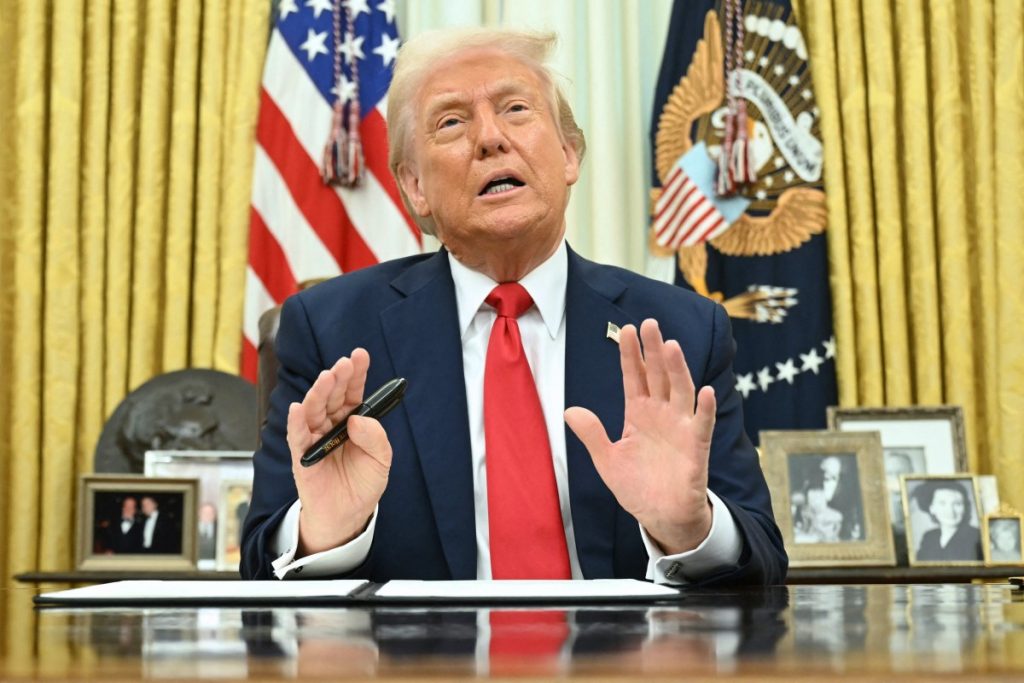President Donald Trump recently announced sweeping tariffs on all export goods to the United States (US) and a baseline 10 per cent tariff on all American imports. Tariffs are taxes on goods and services bought from other countries. They are also percentage of a product’s value. The tariffs that affect over 50 countries, including US major trade partners like China, European Union(EU) countries, Japan, Indian, and Africa, have already triggered a trade war with China. The tariff hike is already causing chaos in global financial markets. Among African countries, South Africa was slammed with the highest tariff of 30 per cent.
Trump intends to use the tariff to boost US economy and encourage US consumers to patronise more American-made goods, increase the amount of tax raised that will lead to huge levels of investors in America. Experts predict that this could upend global economy, and imminent global recession, as well as reduce world’s Gross Domestic Product (GDP) by 7 per cent, according to data from the World Trade Organisation(WTO). China, last Friday, swiftly responded to Trump’s tariff from 84 per cent to 125 per cent. The US leader raised tariff on China to 145 per cent from 125 per cent announced a week earlier. Nigeria is one of African nation’s that will be adversely affected by the new wave of Trump administration’s tariffs.
Henceforth, exports from Nigeria to the US will attract 14 per cent tariff. Going forward, the 14 per cent tariff on Nigerian goods means that a $10 product will attract $1.40 tax on top, raising the total of such product to $11.40. In effect, the companies that bring such goods to the US will pay the tax to the US government, and such firms can choose to pass on some or all the cost to the final consumers. The 14 per cent tariff on Nigerian exports marks a significant change in the trade dynamics between both countries.
According to data from the National Bureau of Statistics (NBS), Nigeria’s trade with the US totaled N31.1trillion between 2015 and 2024. Total imports within the period stood at N16.4trillion, or 8.7 per cent, meaning that Nigeria is at the receiving end of Trump’s new tariffs.
This puts the Nigerian economy on a tailspin. The Federal Government, through the Minister of Industry, Trade and Investment, Dr. Jumoke Oduwole, last week, admitted that several of Nigeria’s oil and non-oil exports will face adverse effects due to the 14 per cent tariff.
Undoubtedly, this will disrupt trade relations and potentially weaken the competitiveness of Nigerian products in the US market. Worrisome too is the fact that the tariff will raise prices of goods and further weaken the value of the naira. It will also worsen already biting economic hardship in the country and slow down manufacturing activities as well as hinder international trade. It will also weaken the demand for Nigeria’s oil, the nation’s major export. Already, the price of oil in the international market has dropped. This will affect the target of the 2025 budget.
Nigeria’s export to the US has averaged $5.5billion annually in the last two years. A significant portion comprises crude oil and gas. The second-largest export category, accounting for 3 per cent includes fertilisers, urea, followed by lead, all valued at $82 million.
Nigeria also exports to the US smaller quantities of agricultural products, such as live plants, flour and nuts. They account for less than 2 per cent of Nigeria’s total exports to the US.
All of these products were previously exempt under African Growth and Opportunity Act (AGOA), a US trade initiative that allows eligible sub-Saharan African countries to export certain products to America duty-free. The overall aim of AGOA is to promote economic growth and development in Africa. With Trump’s sweeping tariffs, there is no hope for AGOA. Admittedly, tariffs can hamper international trade and cause disruptions to the balance of trade between two economies and a fierce trade war between superpowers. This is exemplified by the trade war between US and China.
However, the US tariff should awaken emerging and vulnerable economies like Nigeria and the other developing countries. It is time for the federal government and its policymakers to aggressively boost the non-oil sector by enhancing the quality and control of Nigerian exports to meet global standards and improve international acceptability.
This is the time to reignite the goals of African Continental Free Trade Zones (AfcFTA) agreement, which includes enabling free flow of goods and services across the continent and boosting the trading position of Africa in the global market and eliminate trade barriers in Africa. Therefore, African leaders should take the Trump’s tariffs as a challenge to boost their economies through exports and become less dependent on American imports.

